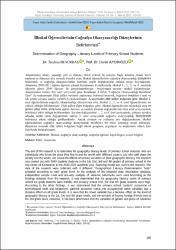İlkokul öğrencilerinin coğrafya okuryazarlığı düzeylerinin belirlenmesi
Künye
Demirbaş, İ. & Aydınözü, D. (2022). İlkokul Öğrencilerinin Coğrafya Okuryazarlığı Düzeylerinin Belirlenmesi . Afyon Kocatepe Üniversitesi Sosyal Bilimler Dergisi , 24 (1) , 100-121 . DOI: 10.32709/akusosbil.949191Özet
Araştırmanın amacı, yaşadığı yeri ve dünyayı farklı yönleri ile tanıyan, başta kendine olmak üzere
topluma ve dünyaya yön verecek bireyler olan, ilkokul öğrencilerinin coğrafya okuryazarlığı düzeylerini
belirlemek ve coğrafya okuryazarlıkları üzerinde çeşitli değişkenlerin etkisini ortaya koymaktadır.
Araştırma 2020-2021 eğitim öğretim yılında Kastamonu il merkezinde ilkokul 1., 2., 3. ve 4. sınıfında
öğrenim gören 2049 öğrenci ile gerçekleştirilmiştir. Araştırmada tarama modeli kullanılmıştır.
Araştırmanın verileri her sınıf seviyesine göre hazırlanan 4 farklı “Coğrafya Okuryazarlığı Belirleme
Testi” ile toplanmıştır. Elde edilen verilerin analizinde; betimsel istatistik, bağımsız örneklem t testi ve
tek yönlü varyans analizi (ANOVA) kullanılmıştır. Araştırmadan elde edilen bulgulara göre, ilkokul 1.
sınıf öğrencilerinin coğrafya okuryazarlığı düzeylerinin orta, ilkokul 2., 3. ve 4. sınıf öğrencilerinin ise
yüksek olduğu belirlenmiştir. Elde edilen diğer bulgulara göre, ilkokul öğrencilerinin teknolojik araç ve
gerece sahip olma, anne-baba eğitim durumu ve meslek durumu değişkenlerinin tüm sınıf seviyelerinde
belirleyici etkisi olduğu belirlenmiştir. Seyahat değişkeninin 1., 2. ve 4. sınıf seviyesinde, yabancı uyruklu
arkadaş sahibi olma değişkeninin sadece 3. sınıf seviyesinde coğrafya okuryazarlığı düzeylerinde
belirleyici etkisi olduğu görülmektedir. Ancak cinsiyet ve yerleşim yeri değişkenlerinin ilkokul
öğrencilerinin coğrafya okuryazarlığı düzeylerinde belirleyici bir etkisi olmadığı tespit edilmiştir.
Araştırma sonunda elde edilen bulgulara bağlı olarak program, uygulayıcı ve araştırmacı odaklı bazı
önerilerde bulunulmuştur. The aim of the research is to determine the geography literacy levels of primary school students, who are
individuals who know the place they live in and the world with different aspects, and who will shape the
society and the world, and reveal the effects of various variables on their geographic literacy.The research
was carried out with 2049 students studying in the 1st, 2nd, 3rd and 4th grades of primary school in the
city center of Kastamonu in the 2020-2021 academic year. Scanning model was used in the research. The
data of the research were collected with 4 different “Geographical Literacy Determination Tests”
prepared according to each grade level. In the analysis of the obtained data; descriptive statistics,
independent sample t-test and one-way analysis of variance (ANOVA) were used.According to the
findings obtained from the research, it was determined that the geography literacy levels of primary
school 1st grade students were middle, and primary school 2nd, 3rd and 4th grade students were high.
According to the other findings, it was determined that the primary school students' possession of
technological tools and equipment, parental education status and occupational status variables had a
decisive effect on all grade levels. It is seen that the travel variable has a decisive effect on the level of
geography literacy at the 1st, 2nd and 4th grade levels, and the variable of having foreign friends only at
the 3rd grade level. However, it has been determined that the variables of gender and place of residence do not have a determining effect on the geography literacy levels of primary school students. Depending
on the findings obtained at the end of the research, some suggestions were made focused on the program, practitioner and researcher.
Kaynak
Sosyal Bilimler DergisiCilt
24Sayı
1Bağlantı
https://dergipark.org.tr/tr/pub/akusosbil/issue/69100/949191https://hdl.handle.net/11630/10455
Koleksiyonlar
- Cilt 24 : Sayı 1 [25]



















